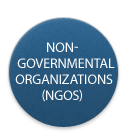 My recent post on helping the unemployed generated a lot of interest — shared over a thousand times on Linkedin. I take it that a lot of us would like to do something to help the millions that are unemployed. Here’s my small contribution to that cause.
My recent post on helping the unemployed generated a lot of interest — shared over a thousand times on Linkedin. I take it that a lot of us would like to do something to help the millions that are unemployed. Here’s my small contribution to that cause.
A few years ago my wife and I were fortunate to land a contract to work for the Global Fund to Fight AIDS, Tuberculosis, and Malaria in Geneva, Switzerland. The Global Fund does remarkable work helping millions of people suffering from these three diseases in developing countries. The Fund also receives 30 percent of its money — several billion dollars — from the U.S. Government. Very few Americans work here. There are a large number of such organizations that do great work and are the recipient of the U.S. Government’s largess — some $50 billion in most years. Most people who work in these organizations are on short-term contracts (three months to three years). Many of the jobs they have are not widely advertised, being only available on their website and some on Devex.
Many of these jobs are filled from a limited talent pool or from a small diaspora of “developmental nomads” who move from one NGO and UN agency to another. That does include some Americans, but they are less than 5 percent. Many NGOs also spend significant funds on recruiting employees from around the world. While some of these jobs do require special expertise in terms of the regional experience, language, or skills and experience necessary to work in developmental roles, most are mainstream jobs like finance, HR, IT, and healthcare that require the same skills that apply in any organization. In theory these positions are open to anyone, but the visibility of these is extremely low which makes it highly unlikely that any qualified Americans would apply, much less be hired.
At the Global Fund, for example, most jobs are filled with hires from Europe and Asia. Consultants employed by firms from France and the UK filled 100 percent of consulting positions. We had admin assistants from South Africa, Ecuador, the Ukraine, most African countries, and even East Timor, but only one who was an American.
What I’d like to see is a law that requires NGOs to make certain efforts to recruit Americans. For example:
-
Any organization receiving more than $10,000 must post all their job openings (temporary and permanent) to a special website intended to disseminate this information to Americans.
-
Any organization receiving more than $50,000 must, in addition to the above, subscribe to a database of Americans who have an interest in such positions.
-
Any organization receiving more than $250,000 must fill a certain number of their jobs from qualified Americans or demonstrate that serious efforts were made to do so.
The above requirements are not onerous on any recipient. The effort necessary to post jobs or search a database is minimal and in any event is already being done by most, but not in a manner that specifically benefits Americans. Getting to where these jobs are is not a challenge — most people are hired from elsewhere and the NGO pays for travel.
The immediate impact of such a law would be to make available over 60,000 job openings annually and over 100,000 short-term assignments to Americans. On average, about 42 percent of full-time jobs and 70 percent of short-term or temporary roles are filled through job boards at these NGOs. Assuming that only 20 percent of those numbers apply here because the same jobs will be available to people in other countries, there would still be more than 5,000 permanent and 14,000 temporary jobs filled by Americans.
So write to your representative in Congress to support such a law. Here’s a directory of all members of Congress. Also write to the Congressional Subcommittee on Health, Employment, Labor, & Pensions and ask for the same.
For readers outside the United States I’d like to mention that I would have no problems with their governments doing the same.